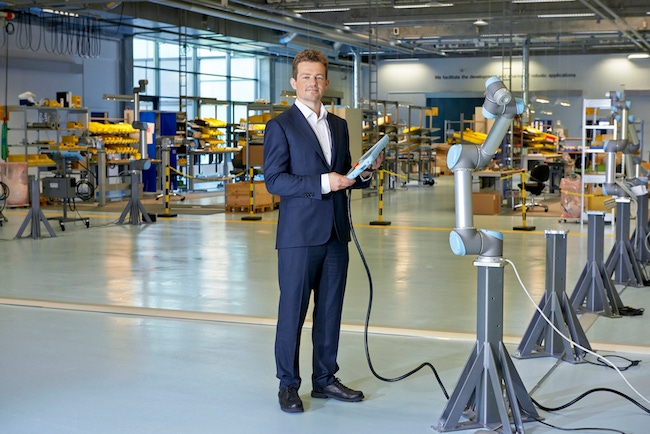Universal Robots’ Esben Østergaard receives automation industry’s highest honor
The pioneer in collaborative robotics has been named by the Robotics Industry Association as this year’s recipient of the Engelberger Robotics Award, described as the “Nobel” prize of automation.
May 31, 2018

Denmark’s Universal Robots (UR; Odense) played an instrumental role in the development of collaborative robots, commonly called cobots, which have transformed the industrial automation landscape in a few short years. The company’s Chief Technology Officer Esben Østergaard was a pioneer in this field, and his contribution was recognized this month when the Robotics Industry Association (Ann Arbor, MI) awarded him the Engelberger Robotics Award, which has been called the Nobel prize of robotics.
|
Esben Østergaard, Chief Technology Officer at Universal Robots, is the youngest recipient of the Engelberger Robotics Award in the program's history. |
Universal Robots is credited with launching in 2008 the world’s first commercially viable robot able to operate safely outside enclosures. The concept was not an easy sell at the time, but Østergaard and his team prevailed by developing a lightweight robot that was easy to use and did not raise safety concerns in the workplace. Programming via an intuitive tablet interface enabled users with no previous programming experience to quickly set up and operate the UR robots. Today, Universal Robots reportedly has a 58% share of all cobots sold worldwide; the company posted a stunning 72% growth rate in 2017.
Universal Robots is exhibiting in booth 2303 at the co-located PLASTEC East and Medical Design & Manufacturing (MD&M) East, part of the largest advanced design and manufacturing trade show and conference on the East Coast. The event comes to New York from June 12 to 14, 2018. Register now! |
“I’m deeply honored to win the award named after Joseph Engelberger, who revolutionized industrial manufacturing with robotics,” said the 44-year-old Østergaard, the youngest recipient of the award in the program's history. “Engelberger’s view that a robot should be able to handle a range of tasks in a factory aligns with Universal Robots’ core mission, and I’m a great admirer of his work.”
Østergaard and his team notably developed force and safety control features, which ensure that if the robot risks coming into physical contact with a human, it automatically stops operating to prevent bodily harm. These features have eliminated the need for safety cages in a vast majority of UR robot applications currently installed and remain a trailblazer for the “collaborative robot” concept, said UR.
But safety is just “the cost of entry” into the cobot market, said Engelberger, who has larger ambitions. “We want to place control of factory automation back into the hands of operators—instead of replacing people, we want to give them a tool to do their work more efficiently. We want to remove them from working like robots to becoming robot programmers and handling more value-added tasks.”
“This redeployment of human creativity interspersed with the robot’s repeatability addresses the market evolvement and customer requirements demanding a high degree of product individualization. It’s a qualitative change both in the products made and for the people making them,” said Østergaard.
Østergaard will accept the award at a ceremony on June 20 at the Hofbräuhaus in Munich, Germany, as part of Automatica and the International Symposium on Robotics.
About the Author(s)
You May Also Like



